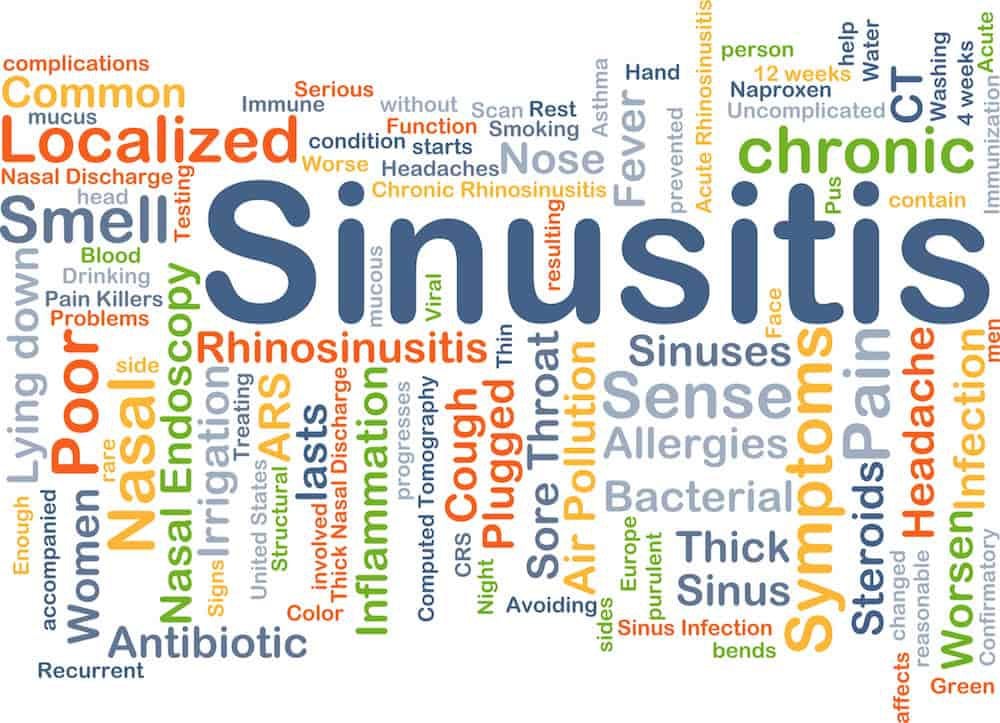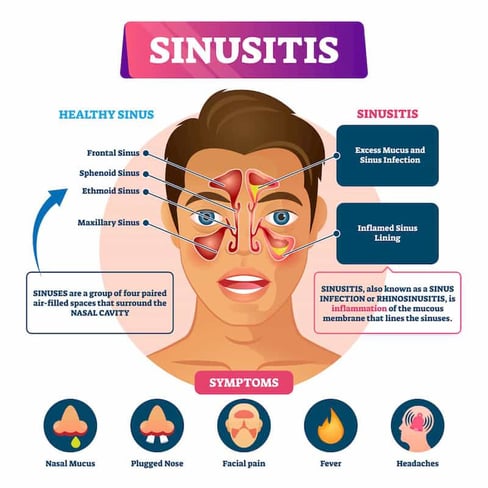6 Common Symptoms of Chronic Sinusitis To Watch Out For
November 24th, 2022 | 6 min. read

Sinus infection (sinusitis) is a major health issue. It impacts 31 million individuals in the U.S. alone, with Americans spending over $1 billion on OTC medications each year to treat it. Chronic sinusitis is evaluated and managed in a similar manner as acute sinusitis. Below you'll learn more about chronic sinusitis and six of its most common symptoms.
What Is Chronic Sinusitis?
Sinusitis is inflammation of your nasal or sinus passage. Chronic sinusitis is where you have chronic inflammation of your nasal or sinus passages that lasts for over 12 weeks at a time. If you experience more than four sinusitis episodes within a one-year period, it's considered recurrent sinusitis.
Get your chronic sinusitis treated today!
Please schedule an appointment for your sinusitis today at one of our 9 convenient locations in Houston, TX.
Often, a bacterial (germ) infection causes it. In some cases, fungi (molds) and viruses cause it. Individuals with weak immune systems have a higher risk of developing a fungal or bacterial sinus infection. Some individuals who have allergies experience "allergic fungal sinus infections."
Your sinuses are cavities filled with air. They're located:
-
Behind your eyebrows and forehead
-
Within your cheeks' bony structure
-
Behind your nose directly in front of your brain
-
On both sides of the bridge of your nose
A sinus cavity infection close to your brain could become life-threatening if you don't have it treated. It could spread to your brain, in rare cases.
You normally have a thin layer of mucus that lines your sinuses and traps germs, dust and other particles in the air. Your sinuses have tiny hair-like projections that sweep the mucus (as well as anything trapped in it) towards openings leading to the back of your throat. It slides down to your stomach from there. This is a continuous process which is a normal body function.
When you have a sinus infection, it stops the normal mucus flow from your sinuses to the back of your throat. Those small little hair-like "sweepers" then become blocked when you have an infection that causes your tiny nasal tissues to become inflamed. This swelling traps mucus in your sinuses.
Some individuals experience bodily defects contributing to sinus infection. Common defects include:
-
Nasal polyps (these are benign nasal growths containing mucus)
-
Bony partition deformity between your two nasal passages
-
Narrowing of your sinus openings
Individuals experiencing these defects frequently suffer from recurrent sinus infections and struggle with several symptoms.
6 Symptoms of Chronic Sinusitis 
Chronic sinusitis can display symptoms such as:
1. Nasal Inflammation
The spaces inside your head and nose (sinuses) become inflamed and swollen for more than three months despite treatment. This inflammation interferes with the normal drainage of your mucus, making your nose stuffy. It can be difficult to breathe through your nose and the area around your eyes may feel tender and swollen.
Sinus inflammation is caused by bacteria, virus, allergies or fungus. The inflammation keeps your sinuses from draining as they should and this leads to mucus build-up and secondary infection.
2. Colored Nasal Drainage or Colored Post Nasal Drip
Sinusitis often presents nasal discharge as your mucous membrane of your sinuses and nose are attached. The drainage can be:
-
Colored yellow or green
-
Cloudy
-
Foul-smelling
-
Blood-tinged
This discharge increase is why individuals have to blow their nose frequently. If this discharge trickles down your throat, it could lead to an unpleasant taste in your mouth as well as an itchy feeling in the back of your throat, called post-nasal drip.
3. Sore Throat and Cough
The fluid trickling down your throat can cause irritation (particularly over a long period of time) and produces a cough. When you lie down at night, you'll experience more flow of fluid down the back of your throat, making your cough worse. Post-nasal drip could also make your voice sound hoarse and possibly cause a sore throat and bad breath.
4. Nasal Obstruction or Congestion
The inflamed sinuses can impact your breathing. It's harder for air to travel past because of the swelling of your nasal and sinus passages. This can affect your sense of taste and smell and make it hard to breathe through your nose.
5. Pain
Sinus pressure/pain is something many experience with sinusitis. You might feel the pain:
-
Under your eyes
-
Around your eyes
-
Around your nose
-
On your forehead
The roots of your teeth protrude into the floor of your maxillary sinus, causing you to feel pain in your teeth.
You could also experience sinus pain similar to the feel of generalized headaches. It can be throbbing and could become worse when you bend down or strain.
6. Reduced Sense of Taste and Smell
Sense of smell is an especially essential thing to address and unfortunately, it's frequently not addressed. Changes in smell/taste or loss of taste and smell because of sinusitis can be extremely frustrating, particularly when there's a lot going on in your life.
Being able to smell impacts your ability to taste. Both work together, therefore, when you can't smell, your taste buds can't detect many flavors. An ongoing process in the sinuses or nose, such as chronic sinusitis, is the most common cause of loss of smell.
Some individuals with this issue report their sense of smell comes back after showering or exercising. But, it's only temporary relief. Others report a temporary improvement with medicine like corticosteroids or antibiotics.
Fatigue, Depression, and Chronic Sinusitis

Many individuals with sinusitis will stress to you chronic sinusitis is no minor thing at all. It's long-term symptoms can lead to fatigue with possible depression or can worsen depression in a few ways:
-
As weeks of symptoms continue to drag on, the discomfort can really take a toll. If you already struggle with depression, the added stress the symptoms bring on can make it worse.
-
Sleep issues are common in individuals with chronic sinusitis and not obtaining quality sleep could hurt your mood even more.
-
Many individuals with this condition have allergies and studies show a possible link between allergies and depression, probably due to the inflammation-promoting immune substances an allergy attack releases.
Once you feel depressed, you may find life to be bleeker and more difficult to manage, including your sinus symptoms. Research has shown depression can enhance sinus-related issues in various ways:
-
Those with chronic sinusitis and are depressed state experiencing worse sinus pain than those without depression. They also claim to have more difficulty with day-to-day activities and have less energy, both of which are true signs of depression.
-
In those with chronic sinusitis, depression is linked with increased antibiotic use, more missed workdays and more doctor visits.
-
Those with chronic sinusitis, depression scores and anxiety scales are strongly linked with scores on the Sinonasal Outcome Test-22 (SNOT-22), a questionnaire that includes both general quality-of-life and disease-specific questions.
When you're experiencing both full-blown depression and chronic sinusitis, they can fuel one another and make your symptoms worse. Therefore, treating just one of these conditions might not provide you with total relief. You might have to obtain a professional diagnosis and receive treatment for both of these conditions to feel your best.
Preventing Chronic Sinusitis
Fortunately, there are steps you can take to decrease your risk of chronic sinusitis. Some include:
-
Manage your allergies. You'll want to work closely with your doctor to manage your symptoms and keep them under control. Avoid being exposed to things that trigger your allergies if possible.
-
Avoid upper respiratory infections. Reduce contact with individuals with colds. Be sure to wash your hands often with water and soap, particularly before meals.
-
Use a humidifier. If you have dry air in your home, such as forced hot air heat, use a humidifier to add moisture to your air to help prevent sinusitis. Keep your humidifier free of mold and clean with regular, thorough cleaning.
-
Avoid polluted air and cigarette smoke. Air contaminants and tobacco smoke can inflame and irritate your nasal passages and lungs.
There are many chronic sinusitis treatments available. Some are treatments you can do from the comfort of your home and provide you with short-term relief. Others aim to treat the underlying cause of your chronic sinusitis. To help treat your chronic sinusitis, you'll want to see your doctor who will likely refer you to an ear, nose and throat specialist for further testing and treatment.
Contact Houston ENT & Allergy Services to Treat your Chronic Sinusitis
Houston ENT & Allergy Services promises to provide compassionate and quality healthcare. We provide comprehensive surgical and medical treatment to patients with disorders and diseases of the ear, nose and throat, including chronic sinusitis. We've grown into one of the largest ENT groups nationwide and consists of board-certified doctors committed to providing you with professional and expert care in the Greater Houston metropolitan area at any of our 12 locations.
If you think you're suffering from chronic sinusitis or would like more information about our services, contact Houston ENT & Allergy Services today.
Article by: Patricia A. Maeso, MD
Dr. Maeso is Board Certified by the American Board of Otolaryngology - Head and Neck Surgery. She completed medical school where she was inducted into the Alpha Omega Alpha Honor Society. She completed an internship in General Surgery and residency training in Otolaryngology - Head and Neck Surgery at the University of Puerto Rico School of Medicine. Following residency, she completed further subspecialty training in Rhinology at the prestigious Georgia Health Sciences University.
Dr. Patricia Maeso is an Otolaryngologist who specializes in Rhinology. She has extensive experience and specialized training in the diagnosis and treatment of nasal and sinus disorders. Her subspecialty in Rhinology positions her as a leading expert in the advanced treatment of sinus conditions.

